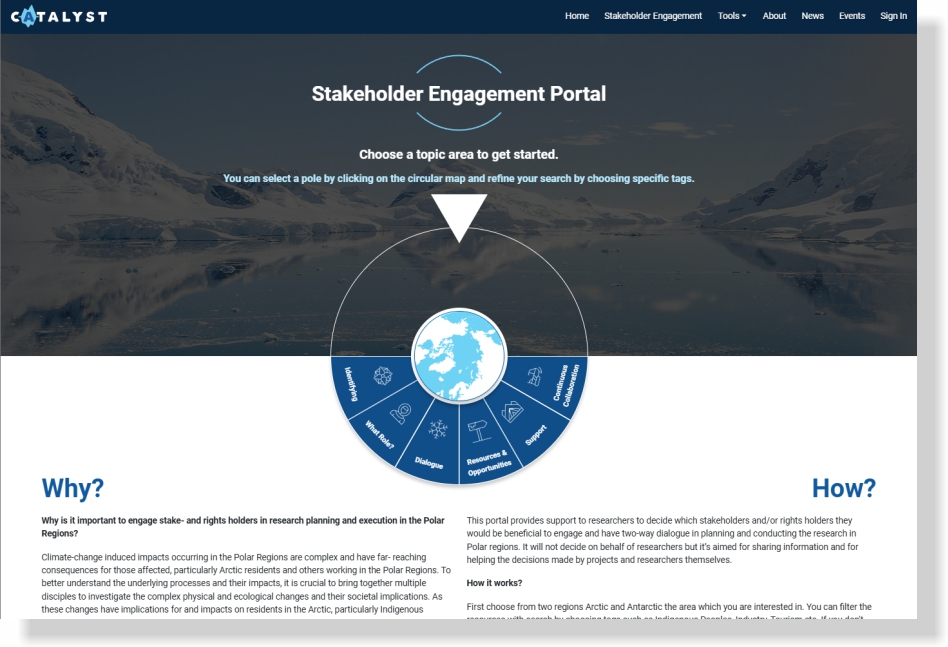EU-PolarNet 2, a Horizon 2020 Coordination and Support Action project, has officially launched its open access Stakeholder Engagement Portal.
 The portal supports researchers in deciding which stakeholders and/or rights holders they should involve in the planning and implementation of research in the polar regions and in conducting a two-way dialogue. It is designed to be used for either Arctic or Antarctic. It provides guidelines by linking to existing resources for identifying, determining the role of stake- and rights holders, dialogue, resources and opportunities, support and continuing cooperation.
The portal supports researchers in deciding which stakeholders and/or rights holders they should involve in the planning and implementation of research in the polar regions and in conducting a two-way dialogue. It is designed to be used for either Arctic or Antarctic. It provides guidelines by linking to existing resources for identifying, determining the role of stake- and rights holders, dialogue, resources and opportunities, support and continuing cooperation.
The portal is aimed to share information and support the decisions of projects and researchers themselves.
Why Stakeholder and Rights Holder Engagement Matters
The impacts of climate change in the polar regions are profound and far-reaching, affecting ecosystems, Indigenous Peoples, Arctic residents, and others who work or live in these areas. Addressing these complex challenges requires input from multiple disciplines and the incorporation of diverse perspectives.
Engaging stakeholders and rights holders in research ensures that:
- Relevant Insights Are Incorporated: Stakeholders bring valuable local knowledge and expertise that outside researchers may lack. For Indigenous Peoples, this includes generations-long understanding of the environment and its conditions.
- Research Is Inclusive and Ethical: Indigenous rights holders must give their acceptance for research conducted on their lands. This engagement not only ensures ethical compliance but also improves the relevance and impact of the research.
- Collaboration Enhances Outcomes: Stakeholders can contribute by shaping research objectives, advising on methodologies, or participating directly in research activities.
What the Portal Offers
The Stakeholder Engagement Portal is a practical tool designed for use in both the Arctic and Antarctic. It provides guidelines and links to existing resources on topics such as:
- Identifying Stakeholders and Rights Holders: Tools to determine who should be involved in the research.
- Defining Roles: Guidance on understanding the roles of different stakeholders in the planning and implementation phases.
- Establishing Dialogue: Strategies for fostering meaningful and respectful communication.
- Accessing Resources and Opportunities: A repository of information to support collaboration.
- Maintaining Long-Term Cooperation: Advice for sustaining relationships beyond individual projects.
How to Use the Portal
The portal allows researchers to tailor their search based on their region of interest (Arctic or Antarctic) and specific tags, such as Indigenous Peoples, industry, or tourism. Users can explore resources under various categories, including:
- Identifying Stakeholders
- Understanding Their Role
- Facilitating Dialogue
- Accessing Resources & Opportunities
- Supporting Continuous Collaboration
If no specific tags are selected, users will see all available materials under each topic.
Important Notes
At present, Russia is not included in the portal due to current geopolitical constraints. However, EU-PolarNet 2 recognizes the importance of Russia in polar research. Should collaboration with Russia resume in the future, the portal will be updated accordingly.
Visit the Stakeholder Engagement Portal
Source: EU PolarNet
